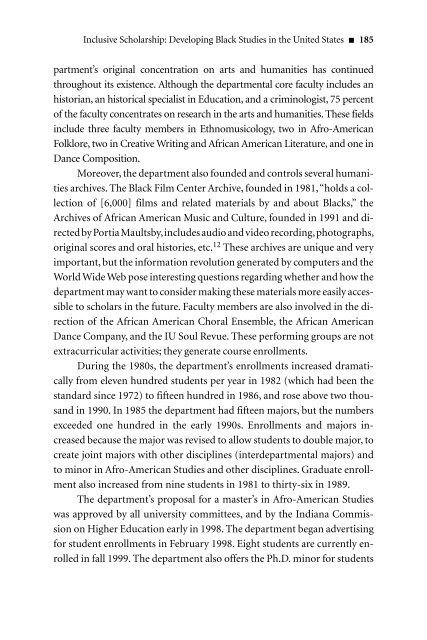Inclusive Scholarship: Developing Black Studies - Ford Foundation
Inclusive Scholarship: Developing Black Studies - Ford Foundation
Inclusive Scholarship: Developing Black Studies - Ford Foundation
Create successful ePaper yourself
Turn your PDF publications into a flip-book with our unique Google optimized e-Paper software.
<strong>Inclusive</strong> <strong>Scholarship</strong>: <strong>Developing</strong> <strong>Black</strong> <strong>Studies</strong> in the United States 185<br />
partment’s original concentration on arts and humanities has continued<br />
throughout its existence. Although the departmental core faculty includes an<br />
historian, an historical specialist in Education, and a criminologist, 75 percent<br />
of the faculty concentrates on research in the arts and humanities. These fields<br />
include three faculty members in Ethnomusicology, two in Afro-American<br />
Folklore, two in Creative Writing and African American Literature, and one in<br />
Dance Composition.<br />
Moreover, the department also founded and controls several humanities<br />
archives. The <strong>Black</strong> Film Center Archive, founded in 1981,“holds a collection<br />
of [6,000] films and related materials by and about <strong>Black</strong>s,” the<br />
Archives of African American Music and Culture, founded in 1991 and directed<br />
by Portia Maultsby,includes audio and video recording,photographs,<br />
original scores and oral histories, etc. 12 These archives are unique and very<br />
important, but the information revolution generated by computers and the<br />
World Wide Web pose interesting questions regarding whether and how the<br />
department may want to consider making these materials more easily accessible<br />
to scholars in the future. Faculty members are also involved in the direction<br />
of the African American Choral Ensemble, the African American<br />
Dance Company, and the IU Soul Revue. These performing groups are not<br />
extracurricular activities; they generate course enrollments.<br />
During the 1980s, the department’s enrollments increased dramatically<br />
from eleven hundred students per year in 1982 (which had been the<br />
standard since 1972) to fifteen hundred in 1986, and rose above two thousand<br />
in 1990. In 1985 the department had fifteen majors, but the numbers<br />
exceeded one hundred in the early 1990s. Enrollments and majors increased<br />
because the major was revised to allow students to double major, to<br />
create joint majors with other disciplines (interdepartmental majors) and<br />
to minor in Afro-American <strong>Studies</strong> and other disciplines. Graduate enrollment<br />
also increased from nine students in 1981 to thirty-six in 1989.<br />
The department’s proposal for a master’s in Afro-American <strong>Studies</strong><br />
was approved by all university committees, and by the Indiana Commission<br />
on Higher Education early in 1998. The department began advertising<br />
for student enrollments in February 1998. Eight students are currently enrolled<br />
in fall 1999. The department also offers the Ph.D. minor for students

















